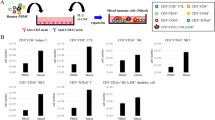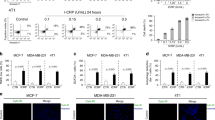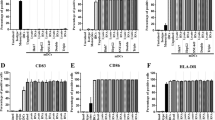Abstract
The present study investigated the ability of supernatants collected from cultures of healthy donor-derived peripheral blood mononuclear cells (HD-PBMCs) stimulated with anti-CD3 monoclonal antibody (MAb) (allogeneic CD3 supernatants; ACD3S) to induce, upon brief exposure, tumour-reactive cytotoxic lymphocytes in cancer patients' PBMCs. ACD3S enhanced natural killer (NK) and lymphokine-activated killer (LAK) cell-mediated cytotoxicity. ACD3S contained increased levels of interleukins (IL) 1, 2, 6, 7 and 12, as well as of granulocyte-macrophage colony-stimulating factor (GM-CSF), gamma-interferon (IFN-gamma) and tumour necrosis factor-alpha (TNF-alpha). MAbs against these cytokines significantly reduced the ACD3S-induced cytotoxicity. ACD3S-induced cytotoxicity was not inhibited by anti-CD4, CD8 and MHC class I MAbs, but was markedly reduced in the presence of MAb against CD18. In contrast to HD-PBMC, ACD3S derived from cancer patients' lymphocytes exhibited lower levels of the above-mentioned cytokines and exerted reduced biological activity. In conclusion, ACD3S are able to activate, upon short-term incubation, tumour-reactive lymphocytes from cancer patients' PBMCs that lyse a variety of tumour targets, including autologous tumours. ACD3S contain high levels of certain cytokines that positively influence the induction of autologous tumour-reactive lymphocytes. Such supernatants can be collected easily from healthy donors and stored until use in clinical trials for adoptive cellular therapy of cancer. They may also be indicated in the construction of cytokine cocktails that have the ability to induce anti-tumour cytotoxicity.
This is a preview of subscription content, access via your institution
Access options
Subscribe to this journal
Receive 24 print issues and online access
$259.00 per year
only $10.79 per issue
Buy this article
- Purchase on Springer Link
- Instant access to full article PDF
Prices may be subject to local taxes which are calculated during checkout
Similar content being viewed by others
Author information
Authors and Affiliations
Rights and permissions
About this article
Cite this article
Baxevanis, C., Tsiatas, M., Cacoullos, N. et al. Induction of anti-tumour lymphocytes in cancer patients after brief exposure to supernatants from cultures of anti-CD3-stimulated allogeneic lymphocytes. Br J Cancer 76, 1072–1080 (1997). https://doi.org/10.1038/bjc.1997.510
Issue Date:
DOI: https://doi.org/10.1038/bjc.1997.510
This article is cited by
-
Modulation of peripheral immune responses by paclitaxel–ifosfamide–cisplatin chemotherapy in advanced non-small-cell lung cancer
Journal of Cancer Research and Clinical Oncology (2013)
-
Combined treatment with Bevacizumab and standard chemotherapy restores abnormal immune parameters in advanced colorectal cancer patients
Investigational New Drugs (2012)



